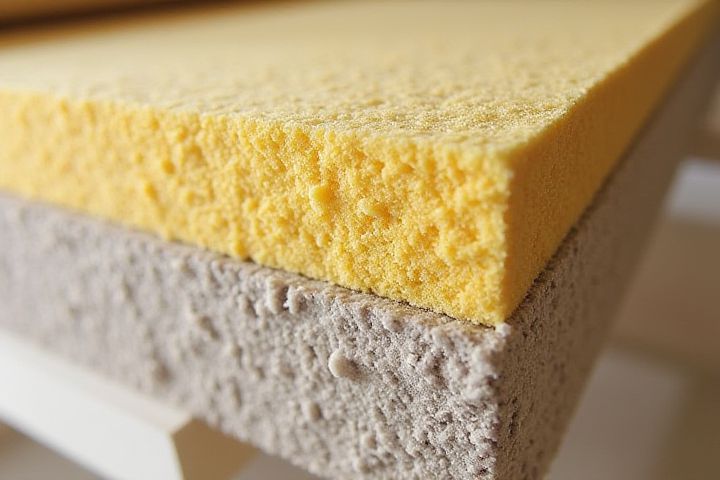
Fiberglass insulation is one of the most popular choices for residential applications, offering excellent thermal performance and energy efficiency. It can effectively reduce heat transfer, contributing to lower energy bills and a more comfortable living environment. Cellulose insulation, made from recycled paper products, is a sustainable option that provides superior air sealing and noise reduction. If soundproofing is a priority, consider mineral wool, which excels in fire resistance and acoustic performance. Your final choice should consider factors like climate, budget, and environmental impact to ensure optimal insulation for your home.
What Is The Best House Insulation Type
Spray Foam Insulation
Spray foam insulation is a highly effective choice for enhancing energy efficiency in homes, thanks to its ability to expand and fill gaps, creating an airtight seal. This insulation type reduces air leakage and prevents moisture infiltration, thereby minimizing the risk of mold growth and improving indoor air quality. With its high R-value per inch, spray foam delivers excellent thermal resistance, making it ideal for both attics and crawl spaces. If you're looking to lower your energy bills and increase comfort, opting for spray foam insulation can be a valuable investment.
Fiberglass Insulation
Fiberglass insulation, with an R-value ranging from 2.9 to 4.3 per inch, is recognized for its excellent thermal performance, making it a popular choice among homeowners. This type of insulation consists of fine glass fibers and is highly resistant to moisture, reducing the risk of mold growth, which can be crucial in maintaining indoor air quality. It is also non-combustible, providing a level of fire safety that some other insulation materials cannot guarantee. For your home, fiberglass insulation can significantly lower energy costs by improving heating and cooling efficiency, making it a cost-effective and efficient choice for maintaining a comfortable living environment.
Cellulose Insulation
Cellulose insulation, made primarily from recycled paper or cardboard, offers a highly effective and eco-friendly option for home insulation. This material is treated with fire retardants and pest-repelling agents, making it both safe and durable for residential use. Its dense structure provides excellent thermal resistance, significantly reducing heat loss in winter and keeping interiors cool in summer. You can expect cellulose insulation to contribute to a healthier living environment, as it has low embodied energy and is often sourced from sustainable materials.
Mineral Wool Insulation
Mineral wool insulation, composed of rock or slag fibers, delivers excellent thermal and acoustic performance with a thermal resistance (R-value) ranging from 3.0 to 4.2 per inch, making it a top choice for energy-efficient homes. This type of insulation is non-combustible, which enhances fire safety by providing higher resistance to heat and flames than traditional fiberglass options. You can also benefit from its sound-dampening qualities, as it significantly reduces noise transmission between rooms or from external sources. Furthermore, mineral wool is designed to resist moisture and mold, ensuring a healthier indoor environment while maintaining its insulating properties over time.
Reflective or Radiant Barrier
Reflective or radiant barrier insulation is highly effective in reducing heat transfer in homes, especially in warm climates. This type of insulation works by reflecting radiant heat away from living spaces, thereby keeping interiors cooler and reducing air conditioning costs. The installation typically involves placing a reflective material, such as aluminum foil, in attics or on roofs, which can significantly lower indoor temperatures during hot seasons. For optimal performance, ensure that radiant barrier insulation is positioned with an air gap to enhance its efficiency against heat gain.
Rigid Foam Boards
Rigid foam board insulation offers exceptional thermal resistance, making it a popular choice for energy-efficient home construction. Comprising materials like polystyrene, polyisocyanurate, and gypsum, these boards provide high R-values per inch, ensuring minimal heat transfer. When installed properly, rigid foam boards can reduce heating and cooling costs, contributing to increased comfort in your living spaces. For optimal performance, consider using them in walls, roofs, and foundation systems to achieve long-lasting insulation benefits.
Sheep's Wool Insulation
Sheep's wool insulation is celebrated for its eco-friendly characteristics and superior thermal performance, making it an excellent choice for sustainable construction. This natural material effectively regulates humidity, absorbing excess moisture without compromising its insulation properties, which helps maintain a comfortable indoor environment. With a high insulation value, sheep's wool achieves impressive energy efficiency, reducing heating and cooling costs for your home. Furthermore, its biodegradability ensures minimal environmental impact, aligning with green building practices.
Cotton (Denim) Insulation
Cotton (denim) insulation is an eco-friendly option made from recycled cotton fibers, providing excellent thermal performance and sound absorption. This sustainable material is non-toxic and free of harmful chemicals, making it suitable for homes with sensitive occupants, including children and pets. Its high R-value indicates superior thermal resistance, which helps reduce energy consumption and heating costs. By choosing cotton insulation, you not only enhance your home's comfort but also contribute to environmental preservation through the use of recycled materials.
Icynene Insulation
Icynene insulation is a spray foam product known for its superior air sealing capabilities and energy efficiency. With an R-value ranging from 3.6 to 6.5 per inch, it effectively minimizes thermal bridging and enhances overall comfort in your home. This insulation can expand up to 100 times its original size, filling gaps and cracks to prevent air leaks. Using Icynene may contribute to significant energy savings, potentially reducing heating and cooling costs by up to 50% over time.
Aerogel Insulation
Aerogel insulation is renowned for its exceptional thermal performance, offering an impressive R-value per inch that far surpasses traditional materials like fiberglass or foam. This lightweight material, composed primarily of air, minimizes heat transfer while maintaining a high resistance to moisture, making it ideal for various climates. You can benefit from its superior energy efficiency, as it significantly reduces heating and cooling costs in your home. Additionally, aerogel's fire-resistant properties enhance safety, providing peace of mind alongside energy savings.
